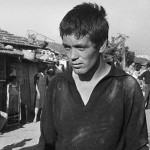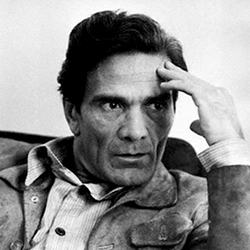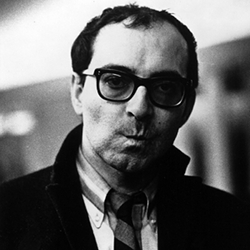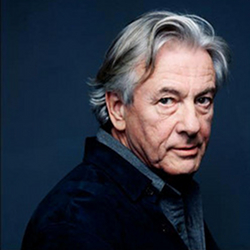
TIFF’s Pier Paolo Pasolini: The Poet of Contamination Review: Mamma Roma (1962) - NP Approved
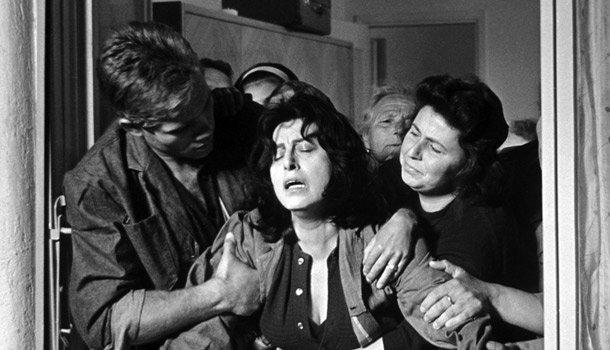
Cast: Anna Magnani, Ettore Garofolo, Franco Citti
Director: Pier Paolo Pasolini
Country: Italy
Genre: Drama
Editor’s Notes: The following review is part of our coverage for TIFF’s Pier Paolo Pasolini: The Poet of Contamination which runs from March 8th to April 12th at TIFF Bell Lightbox. For more information on upcoming TIFF film series visit http://tiff.net and follow TIFF on Twitter at @TIFF_NET.
Pier Palo Pasolini’s second feature, Mamma Roma, is a beautiful film about a mother’s sacrifice to provide a better life for her son. Pasolini uses echoes of the Neorealism style that was established out of necessity 17 years prior by Roberto Rossellini, Vitorio De Sica and others. It’s a style that utilizes non-professional actors and existing sets and locations, partly to lower the costs of the film and partly to evoke a more natural, realistic quality. The only professional actor Pasolini uses in the film is the lead, Anna Magnani, who was in Rome, Open City (1945) which is considered the first film in the Neorealism movement.
Pier Palo Pasolini’s second feature, Mamma Roma, is a beautiful film about a mother’s sacrifice to provide a better life for her son.
Magnini plays Mamma Roma, a prostitute who after 30 years is trying to leave and start over for her now 16 year old son, Ettore (Ettore Garofolo). She’s been largely absent in his life up until now and she wants to be a mother to her son. She felt she couldn’t do this considering her profession and couldn’t move on because she didn’t have the money. Now she’s saved up and wants to take him back to Rome where he can grow up and be somebody.
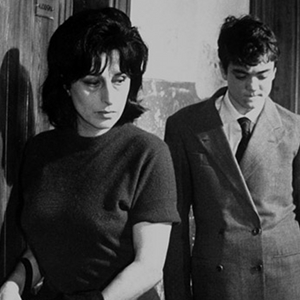
Now in Rome, with Mamma Roma working a produce stand, Ettore still wanders the streets. She tries to get him back into school, but he drops out. He’s running around with a group of kids that pull burglary jobs in the hospital (pretending to visit someone while they’re asleep then take what’s on their stand and sell it) who introduce him to Bruna (Silvana Corsini), a young woman who sleeps with nearly anyone. Ettore falls for hard for her, which angers Mamma Roma. Not that she is against him sleeping with women, even at his young age, but she doesn’t like Bruna and engineers a two-pronged plan to not only get him to forget Bruna but get him a job using a prostitute friend and her pimp.
While all this is going on, Mamma Roma is dodging her former pimp who at first seems to just want money, but a later confrontation confirms that he wants her to go back to walking the streets. She resists at every turn because she does not want her son to know the awful truth of her prior existence and she does not feel that work is befitting to a mother, which is why she was absent during most of his life.
Pasolini uses several clever camera and film techniques to emphasize emotions throughout the film. He uses a moving camera focused on a gateway, pushing forward to symbolize Mamma Roma’s want to keep moving forward…
There is a brilliance to the way Pasolini brings this simple story to the screen. By giving us nearly unfettered access to Mamma Roma, Pasolini makes us part of her life, susceptible to her grace and charm and we know why she was so successful and loved in both her former profession and her current life. He equally divides his time between her and Ettore to show us that while her intentions are good and she does a lot for him, she still fails in her ultimate goal to save her son from a life on the streets.
Pasolini uses several clever camera and film techniques to emphasize emotions throughout the film. He uses a moving camera focused on a gateway, pushing forward to symbolize Mamma Roma’s want to keep moving forward to the next stage in her and Ettore’s lives. On several occasions, he slows the film down to both emphasize loneliness and happiness (an attempt to prolong the happy moment). He never shies away from the unpleasant moments, but also makes sure to make us understand that there is a balance of happiness and sorrow in their lives. That balance draws us in and holds us throughout the film and despite the lack of a formal plot.
Pasolini’s screenplay isn’t one that focuses on or needs plot points but emotional beats. It’s more of a character study than anything. There is the barest of structures is there to move things along, but it grows organically over the course of the film. Pasolini is sure-handed in his treatment of Ettore specifically. Ettore has been essentially on his own most of his life, and then suddenly his mother appears to take him away from the life he knows in order to make him into what she wants. He struggles with her sudden appearance, accepts it, then rejects her to his ruin. Pasolini is also careful when depicting Mamma Roma. He created her character to be filled with good intentions but lack the necessary skills to be an effective mother. She dotes on Ettore but never fully connects with him. She yells at him thinking it will make him want to be better, but it only drives him further into the lifestyle he knew before the move.
Aside from Pasolini’s deft screenplay and stunning yet simple direction, the draw is Magnani. She fully inhabits this character and fills it with joy and sorrow. Her laugh is infectious and comes from her belly. The sorrow she exhibits is plumbed from depths that seem like it would have hurt her to explore in order for her to bring them to the screen. She is a force of nature throughout the entire film, filled with determination and drive and she makes us feel all of her emotions. She is the only one who seems to be consciously giving a performance, but that makes the performance more powerful amongst the non-professionals instead of less. The non-professionals around her give natural performances, quite unlike first time actors of today. They are unaffected and that could be in part due to Magnani’s power and part in Pasolini’s ability to get what he wants from anyone.
Mamma Roma is a shining example of a budding talented filmmaker. It telegraphed a talent that Pasolini himself did not fully take to its fruition. This film was made before Pasolini began making films that explored his darker sexual fetishes and began the next wave of filmmaking styles post-Neorealism. Had he continued on the path suggested by Mamma Roma, he would have created films of raw emotional power that would have resonated universally. Where he went instead was to challenge the boundaries of taste, to be sure, but also of conventions and moral hypocrisy. While part of me laments he did not continue on the trajectory of Mamma Roma, what he did end up being was an important and confrontational director whose works are still discussed and debated nearly 40 years after his death.
Related Posts
![]()
Doug Heller
![]()
Latest posts by Doug Heller (see all)



